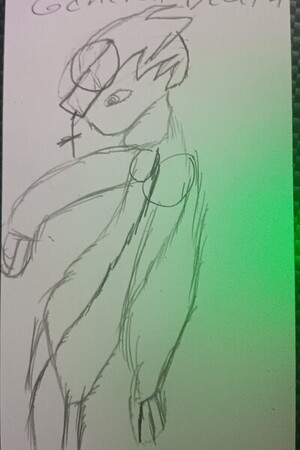Chapter 7:
Finding Evidence
Chasing Hope
Why couldn’t I get a read on Hemlock? That question floated in my mind as I spun in my new office chair. Shortly after Hemlock had left, another man walked in to inform me of my new position: researcher. I couldn’t continue my old project since Dolion wouldn’t be there to supervise me, so I would be doing a different kind of research under a different supervisor until they could find another Arbiter to pick up my project. A valid reason when you consider that I am an Ergasia working amongst Arbiters. But I had a feeling that the underlying reason was to simply stop me from learning more than I should know.
Each time my chair would slow down, I’d nudge the desk and spin again. With nothing to do but think, I pondered on Hemlock and my Lens. What did Hemlock have that kept me from clearly hearing what was on his mind? What other kinds of technology could exist that I didn’t know about? And was Hemlock able to tell that I had a glitch? There were so many unknowns and, as I learned more, the more I realized I didn’t know. The last week or so had been a blur of the unknown. I had more questions than answers and my curiosity growing only lead me towards more dangerous circumstances. Despite knowing that, I found myself unable to stop asking more and wondering more.
“You’re Von, right?”
I spun in one more circle before stopping to see a man, probably not much older than myself, standing in front of me. One hand was shoved into his lab coat pocket while the other was holding a cup of iced coffee.
“Did you want a cup?” He asked, raising his cup slightly. After shaking my head no, he continued, “Well, Von, call me Carter. I’ll be taking care of you while you work here. I’m sorry my specialty isn’t in medicine, but once someone who works in that field wants an assistant we’ll get you transferred over.”
I nodded, “Nice to meet you. What kind of work do you do?”
“More electrical stuff, the complete opposite of what you’re probably used to. But you were so highly praised, I couldn’t say no to an assistant as talented as you. We don’t do a lot of research here, but we build a lot of things for Lenses. Lot of microwork, quite literally. Any questions?”
I shook my head.
“Great! Then, let me get you some manuals and get you started on some simple projects so you can learn your way around.” As he walked away, I listened to what was on his mind, “What a quiet kid. Wonder why Hemlock wants to keep an eye on him. Even if he was researching medicines and got too deep, he’s just a kid.”
Figured as much.
“Guess I should give him something easy to start with until he learns his way around the lab.”
He didn’t give me anything new. I guess I shouldn’t expect people to just be thinking about the answers that I needed, but it was always worth a try. Even through the pain and extra-blurred vision, it’d be worth it to keep checking in.
The work I was given was nothing extraordinary, which Carter apologized for repeatedly saying he wished he was more prepared and had more for me to do. Since his office and lab both were a bit chaotic, he had simply asked me to organize some of the equipment and materials. But the things he did hand over to me to organize were quite interesting. He had sent a manual over to my Lens so I could see a chart of what each part did that I was looking at.
Because of the new nature of my work, I could begin to get answers to questions concerning my own Lens. “Can I get more reading material on Lenses?” I had asked before I was left on my own. Carter thought it was a fantastic idea and sent over everything he had, including things that weren’t available to the public.
As I organized, I let videos play showing how Lenses were first created versus how they were being created now. Despite the ability to have everything done by AI and technology, this was something that still always went through the hands of people before being sent out to the public. A template that can be refined by people like Carter gets uploaded into a computer that creates individual parts: the parts I was busy organizing. Then Carter and other staff members inspect them before sending them off to an AI to assemble. Everything gets checked one more time before being available for implant, and Carter is there for nearly every step. It was no wonder he quickly agreed to having me as an assistant no matter my background.
Post installation, there is a program that runs frequently to alert the user of problems. This I was aware of, mine ran frequently and had yet to report any issues. However, a protocol I was unaware of stated that if there were known issues to the user that were not being reported that it could be the result of an underlying problem and should be immediately reported and investigated. People in the past who had a similar issue to mine also had underlying vision problems and their Lenses were immediately removed due to the failure of being unable to report back to our leadership. It was written that it was too risky to leave something as advanced as the Lens unmonitored.
I let the videos play through before taking a break to read more. Memories could be recorded, stored, and sent. Something I was fully aware of. But on a corrupted Lens, one that was experiencing glitches of the same nature as mine, have been able to be programmed to display memories until certain triggers. People had also previously been experimenting with leaving behind their consciousness inside of a Lens, yet nothing I read stated that it had succeeded.
I sighed as I looked at the pieces scattered in front of me. All these tiny pieces that I couldn’t tell the difference between without magnifying them made up such an incredible piece of technology, a dangerous piece of technology. Messing with memories and consciousness seemed terrifyingly similar to what I had experienced with Stephen’s voice playing through my mind. What exactly did he know and how did he know it?
“My dad was a researcher.” I remembered him saying when we were younger and began playing the memory, “Mom told me not to do research like Dad. She said that it’s a bad job. When I asked her why she just cried.”
When we were a little older, we had a similar conversation, “Mom doesn’t want me to get a Lens, she said that if it glitches it can hurt me pretty bad and that scares her a lot for some reason.” I had asked him if he was going to get one anyway when we were old enough to which he answered, “Of course! I want to be able to chat with you from anywhere at any time by just thinking, how cool is that? And our parents would have no clue what we were thinking.” He used to laugh so brightly.
After he got his Lens, however, it seemed like he learned more and grew scared of it. He had warned me so adamantly to watch what I thought and was concerned enough to potentially leave a part of his consciousness with me to be triggered at a specific time.
His dad was a researcher. I went back to that memory and ones where we had talked about his dad who had gone missing when he was younger. We assumed that he had just gotten into an accident in a lab considering it was just us that said he was missing. It seemed his mom and my parents knew what happened, but they wouldn’t talk about it. We had never talked about what kind of researcher he was, though.
“What if…” I mumbled out loud and searched the documents I was given for Stephen’s family name. Nothing appeared and I slumped into my chair in disappointment.
“Too much work to do alone? Sorry about that.” Carter reentered the room, placing a coffee in front of me, “I know you said you didn’t want one earlier, but after seeing how much work there is to be done I thought it might encourage you a bit.”
I gratefully took the cup, “Thanks. I’m not discouraged at the work, just at how much I don’t know. I’ve been reading while I work and it’s amazing.”
Carter laughed, “I know what you mean! I’m always learning something new, I don’t think we’ll ever stop. If you ever have any questions, feel free to ask me! I might know a few things that can help you.”
I hummed, “Not because it will affect my work, but rather out of curiosity, has an Ergasia ever worked in a lab like this before me?”
“Since I’ve been here there hasn’t, but,” he paused, “between you and me, there was one maybe twenty years ago. He got kicked out though, so no one talks about it. Don’t worry though! You won’t get kicked out!”
I laughed at Carter’s reassurance before being left to my own accord again to continue organizing. It could’ve been Stephen’s dad that was here. Perhaps his name was simply taken out of documentation. I began sorting while reading once again and found a story of an Ergasia that was researching consciousness. Not much was said other than that he existed, he assisted in the research of how to transplant your consciousness into someone or something else, and that he was let go after only a few years.
“As Arbiters,” an interview with his supervisor had read, “we should be able to live on way past normal life expectancy. It’s something we deserve to be able to do, right? To be able to live and see our grandchildren have grandchildren. We are creating a way to do exactly that.”
And it was reported that he succeeded and began distributing his technology to other Arbiters within the time frame that the Ergasia man had been working.
It’s too much to think it’s a coincidence, right? Even if I tried to play it off as one, it kept gnawing at the back of my mind as I worked. There weren’t any videos or articles that talked about the Ergasia that had once worked here in particular, but many mentioned a coworker of lower standing, an Ergasia assistant, an unnamed man who was helping with the Arbiter’s research. Right then would’ve been a great time for Stephen’s consciousness to come back and tell me if my guess was right.
I let an interview play in the background as I worked, one from maybe fifteen years ago, after the Ergasia had been let go. The topic was still concerning researching ways to extend life expectancy, but as the interview went on it sounded less and less like “how can we do it,” and more like “is there a better way to do it.”
“Do you mean to say that we can change how we look?” The interviewer had asked.
“Well, in a way. As of right now, we can keep our bodies alive for a long time, right? Perhaps an extra fifty to a hundred years or so. But, they still deteriorate and require medicine, check-ups, maintenance, and the like. But with the ability to transfer your consciousness, well, we wouldn’t have to worry about that anymore. If I can live on in another body, perhaps an artificially created one that cannot get illnesses or grow old, then I could live until I was tired of living.” He had laughed and continued discussing how the research had been performed and how it was a reliable option available to Arbiter’s.
I went through interview after interview with the same researcher, read his articles, and attempted to find his research in the stacks of data that Carter had given me. I compiled data to share with the Inveiglers when I returned home, who I could imagine being shocked that I was able to find what they were looking for so quickly: evidence that we were being lied to.




Please sign in to leave a comment.